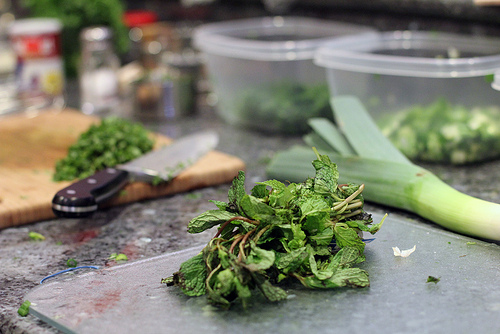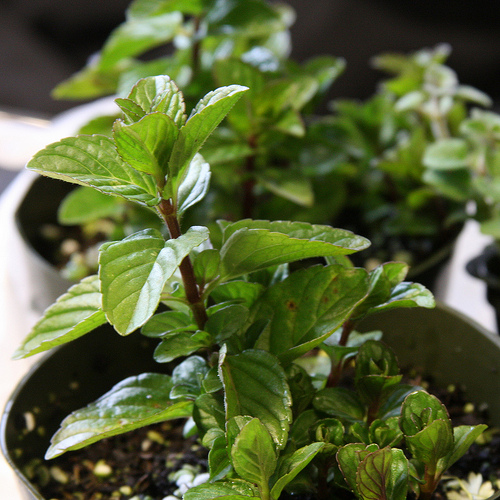Cooking with fresh herbs

You have probably heard that fresh herbs are better than dried herbs. It's so true! You may be skeptical of these claims - after all, people claim a lot of stuff, especially when it comes to cooking. But the difference between fresh herbs and dried herbs is truly amazing. Once you try something made with fresh herbs, you may never want to go back to the dried stuff again!
In fact, there are only two advantages to dried herbs. Although admittedly they are pretty big. Dried herbs are more convenient (easier to ship, easier to store, longer shelf life) and more varied (I have no idea where to find fresh turmeric, is that even a thing?) than fresh herbs.
But that being said, for those herbs you can find fresh, the flavor and nutrition boost is incredible.

Image courtesy Flickr/Three Points Kitchen
Finding Fresh Herbs
Farmer's markets are a great source of fresh local herbs. Many farmstands and growers keep an herb garden running year round if they can, to help fill in the gaps in their produce sales. These herbs will not only be local, they will also be super fresh!
You can even find some fresh herbs at the grocery store. My standard store - a basic off-the-rack Safeway in a rural area - carries bunches of fresh herbs like thyme and basil in the produce section. Look in the refrigerated area, where they keep all the weird stuff like kumquats and various fresh hot peppers.
And finally, you can always grow your own! Many herbs grow well in small container gardens. If you have a sunny kitchen window, window ledge, porch, or patio, you can probably grow herbs. It's great to be able to pick some leaves fresh from your own garden when it comes time to cook.

Image courtesy Flickr/Muy Yum
Storing Fresh Herbs
If you're not careful, fresh herbs can go wilty or wither before you are ready to use them. Cut herbs are just pieces of plants, and they keep best the same way you would keep a plant cutting or bunch of fresh flowers. Snip off the ends of the stems, then place the herbs in a glass or jar of water.
If you need to keep them chilled (e.g. in summer if you have an overheated kitchen) just loosely cover the whole shebang with a plastic bag first. This protects the herbs from getting frostbitten in your fridge, and helps retain their humidity.
You can still use herbs that have gone a bit wilty. As long as they smell fine and show no signs of actual mold or decay (like black sludginess) they are still perfectly edible.
Cleaning Fresh Herbs
Like all produce, herbs should be at least rinsed before you use them, to get any dirt off. You can either rinse them under the tap, or fill a bowl with clean water and submerge them for a few minutes. After rinsing, pat them dry with a paper towel.

Image courtesy Flickr/QuintanaRoo
Using Fresh Herbs
As a general rule, you will be using the leaves and not the stems. It's not that the stems aren't edible or flavorful, it's just that no one likes getting a wedge of stem when they are eating their meal. That being said, don't stress about the stems too much. If there's a little bit of stem in there, you will take care of it in the mincing process.
With some herbs (like basil) it's easy to pluck off the leaves and use them. If you have a huge volume of herbs (e.g. if you are harvesting them from your own garden) remember that the tips are always the most tender and flavorful.
For smaller herbs like thyme, you can strip off the leaves in one quick motion. Hold the tip of the branch in one hand. With your other hand, pinch the stem between your thumb and forefinger. Slide your fingers backwards down the stem, which will pop off all the leaves as you go.
If you are using fresh herbs in a recipe, please note that dried herbs have a more concentrated (if staler) flavor. Thus, when substituting fresh herbs in a recipe that calls for dried herbs, you want to use about twice as much fresh as dried.
Main image courtesy Flickr/Salvadonica, Chianti, Turkey

0 comments